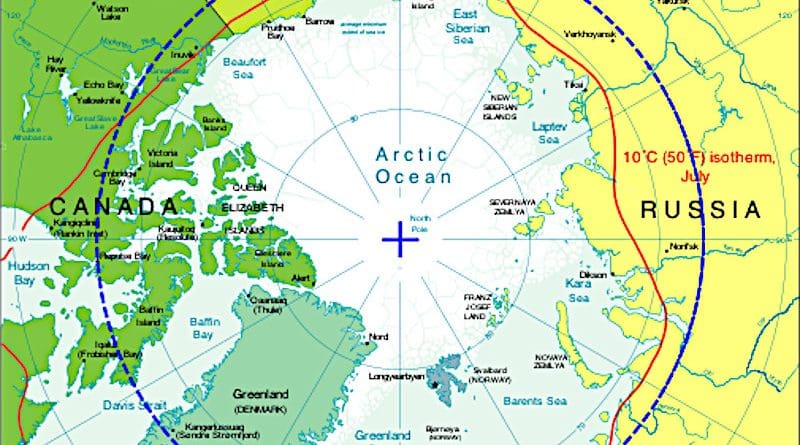India At The Arctic Council – OpEd
India has had big successes during its first stint as an observer in the Arctic Council. Since then, the country has made substantial progress in its climate action pledges and developed comprehensive strategies to mitigate climate change. With its re-election, India can now offer much more to the global organisation’s role in promoting environmental stability in the polar region.
By Chaitanya Giri*
In 2019, India was re-elected as an Observer to the Arctic Council,, a multilateral organisation consisting of eight littoral Arctic nations that works towards promoting cooperation, coordination and interaction among the Arctic states, its indigenous population, and other inhabitants on sustainable development and environmental protection. India was first granted the Observer status in 2013, along with five other nations. During its previous tenure, India has had privileged access to Arctic Council’s side-events and the Ministry of Environment, Forests and Climate Change made vital contributions to the Arctic Migratory Birds Initiative (AMBI) under the Arctic Council’s Conservation of Arctic Flora and Fauna Working Group. The ministry has facilitated studies and conservation efforts of migratory birds that fly to India during northern winters.
India’s experience in the AMBI has helped it recognise what is now known as the Gandhinagar Declaration, which emphasises that improvement of ecological connectivity is the top priority for the Convention on Migratory Species. In February 2020, the Government of India hosted the Convention of Migratory Species under the 13th United Nations Environmental Programme Conference of the Parties (UNEP-COP-13) in Gujarat’s capital city Gandhinagar. The convention was used to prepare effective action plans for preventing the killing, taking, and trade of migratory birds traversing the Asian, African, Eurasian and American flyways, and formulate ecological conservation measures applicable to all UNEP (United Nations Environment Programme) member countries. The Gandhinagar Declaration is, perhaps, India’s most significant success coming out of the relatively limited engagement it has had with the Arctic Council. But India has a lot to offer to the Arctic Council, more than ever before.
In the past seven years, India has been tremendously successful in meeting the commitments of global climate action goals. In 2015, India led a global coalition of 121 countries towards establishing the International Solar Alliance. In 2019, India took the mantle of establishing an international multi-sectoral Coalition for Disaster Resilient Infrastructure to mitigate impacts on ecological, economic, and social infrastructure. India’s forest cover has increased substantially in these years, and the large polluting industries are proactively pledging to attain sustainable development goals in this decade. India does all this despite ranking amongst the lowest per capita carbon emitting countries in the world.
In late 2020, India recorded substantial progress in its climate action pledges made during the 2015 Paris Agreement and became one of the few countries and the only large economy to do so. India’s “spirit of trusteeship towards planet Earth,” as professed by Prime Minister Narendra Modi during the G20 Summit in November 2020, sums up its efforts as a conscientious economic power. This conscientiousness qualifies India as an equitable partner to the Arctic Council members and observers.
India is also in the advanced phases of formulating a comprehensive National Arctic Policy. This policy framework will streamline India’s engagements and activities in the region. The consolidation of this policy will develop strong technical, scientific, economic, financial, and strategic capacities within the country, which will only accentuate India’s role in the Arctic Council. However, the council is not the only entry point for India in the Arctic region. India maintains cordial and productive bilateral relations with all Arctic Council members. These bilateral relations are the main drivers of India’s economic and strategic engagements in the Arctic.
India is a crucial stakeholder in constructing the North-South Transport Corridor; it contributes to the Russian Far East’s economic development, building maritime links between Chennai and Vladivostok’s ports. India has a co-operation agreement with Finland in environmental protection and biodiversity conservation, which was signed in November 2020. India and the US have been maintaining an effective Climate and Clean Energy Cooperation Agreement since 2015. India imports natural gas from Yamal, Russia, and Louisiana, USA, and has stakes in offshore oil and gas fields in the Northern Pacific.
In May 2021, Russia will preside as the new chair of the Arctic Council, and during its tenure, India will complete a decade as an observer and align its Arctic goals with some of the shared aspirations of other council members. Within the council, India can call for reduction of industrial methane and carbon black emissions and alleviate their disastrous impact on Arctic environments. This call fits well with the Council’s Arctic Contaminants Action Program as well. India and Russia can together partner with observer nations Japan and South Korea, and formulate a strategic Asian Hydrogen Energy Technology Roadmap. The roadmap can focus on sharing of hydrogen fuel and energy technologies that can support transportation, chemicals, fertilisers, electricity generation, and oil refining industries. Also, India’s leadership of the International Solar Alliance can help countries generate the cleanest “green” hydrogen using solar energy, reinstating India’s commitment to secure its energy and trade interests in the Arctic region by respecting internationally amenable environmental safeguards.
*About the author: Chaitanya Giri is Fellow, Space and Ocean Studies Programme, Gateway House.
Source: This article was first published by Gateway House and first appeared in India Perspectives.

